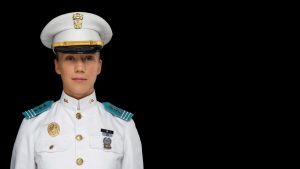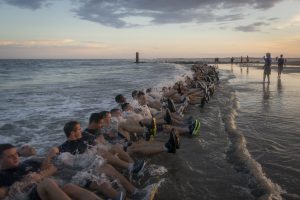It was the story of the summer that everyone was talking about. In the northernmost province of Thailand, 12 young boys and their 25-year-old soccer coach were exploring a cave when they became trapped by flooding after a sudden heavy rainfall. It was June 23, just the beginning of the four-month-long monsoon season, and the world sat on edge, waiting for news of the missing boys and their coach. In the midst of the rescue operation that included the assistance of roughly 10,000 people from around the world, Air Force Maj. Charles Hodges, ’00, became the face of the U.S. effort in the rescue.
There’s a rich Citadel and military history that runs through Hodges’ family. His uncle, for whom he was named, Air Force Capt. Charles G. Hodges, III, ’65, was on a combat deployment in the Philippines when he died of accidental causes. His father, Reverend Richard B. Hodges, ’72, now a pastor in a Presbyterian church, is retired from the Air Force as well as the National Guard. His brother Joseph Hodges, ’07, formerly a striker platoon leader in the Marine Corps and later a logistics officer in the Marine Corps Reserve, is now a civilian nurse in a VA hospital in St. Louis and a flight nurse in the Air Force Reserve. Another brother, who did not attend The Citadel, John Daniel Hodges, served in the Marine Corps and is now in the Marine Corps Reserve. Hodges himself graduated from The Citadel in 2000 with a degree in Spanish. He is currently an Air Force special tactics officer stationed in Okinawa, Japan, and in late June, he was standing ready when Thailand called for support.
When the Royal Thai government sent a request to the U.S. government asking for assistance in the rescue effort of the 12 soccer players and their coach, the request was routed to U.S. Indo-Pacific Command, which sent the request to Special Operations Command Pacific, which sent the request to the 353rd Special Operations Group. This relay occurred in the span of an hour. As commander of the 320th Special Tactics Squadron, which falls under the 353rd Special Operations Group, Hodges is in charge of ground forces—pararescuemen, combat controllers, special operations weather technicians and tactical air control party members. About 19 hours after the initial request, Hodges found himself in a Thai cave immersed in a tactical mission planning operation.
“We approached it as if it were a standard military-contingency type of response, and we applied every single tool that we could to try to find these kids and then ultimately to rescue them.”
Hodges credited his time at The Citadel for his leader development. “It was not an easy experience, but I look back on it with fond memories. It was a time to challenge me. It was a time that I learned a lot. What I learned there was specifically applicable to the Thai cave rescue scenario—just never giving up, not having the option to quit, and sticking with it until the job was done,” he said.
The likelihood of finding the boys and their coach, however, was bleak. Hodges, who has four children with his wife Julie, felt the weight of reality.
“So for me, before the children were found was a challenging point emotionally. We were fully committed, but at the same time we didn’t know if those kids were going to be found. I try to think of myself as a realist, but in this situation I was pretty pessimistic.”
More than two weeks after the ordeal began, however, all 12 boys and their coach were safely out of the cave in a rescue operation that had all of the riveting elements of a best-selling novel. According to Hodges, teamwork—a theme that runs deep at The Citadel—was responsible for the success of the operation.
“We had civilian entities. We had Department of State entities. We had Department of Defense entities, both in the U.S. and on the Thai side, Australians, British, Canadian, Chinese, a European contingent. We had for-profit. We had a nonprofit. We had those who spoke perfect English and those who didn’t speak any English at all. We had everybody and their brother coming together to do this, and still there were never too many people there…. The teamwork aspect of this effort could not be overstated.”
There’s a rich Citadel military history in Thailand. In 1963, Thai Cadets Chokechai Hongstong, Charoensak Thiengtham and Viruch Tangoi graduated—the first of dozens of young Thai students who have come to The Citadel on a Royal Thai Army Scholarship for military training and an education in engineering or one of the sciences. Geographically, Thailand and The Citadel are separated by 9,000 miles, but in spirit and ambition they are aligned, and last summer, they were brothers in arms in a death-defying rescue mission that showed the world the value of teamwork.

 A Dream Fulfilled
A Dream Fulfilled Cyber in the Summer
Cyber in the Summer Sunset on Folly Beach
Sunset on Folly Beach